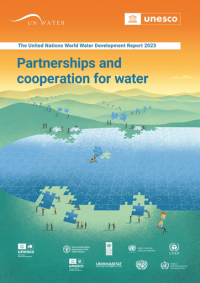Water Supply and Sanitation for Human Settlements

CHAPTER 4: The need for partnerships and cooperation on water supply, sanitation and hygiene (WASH) in human settlements, regardless whether they are formal or informal, is driven by three main factors.
First, the cross-sectoral nature of WASH creates the need for partnerships. Various actors, including the private sector, non-governmental organizations (NGOs) and communities, along with government ministries and departments responsible for WASH, health, housing, agriculture, education, planning and infrastructure, among others, are all handling various aspects of the water supply and sanitation sector. Partnerships and cooperation open up space for additional actors relevant to – but not always considered to be part of – the WASH sector.
Second, the magnitude of the WASH challenges in formal and informal human settlements is such that no one country or institution alone can overcome the growing demand for these services (WHO/UNICEF, 2021). Pollution, climate change impacts and environmental degradation of freshwater resources, combined with the huge infrastructure gap in a world of scarce financial resources, explains the multitude of state and non-state actors involved in water supply and sanitation service provision.
Third, there is consensus that WASH initiatives are much more likely to meet their objectives if the intended beneficiaries participate in a meaningful way in multistakeholder partnerships and cooperation, especially in rural areas and secondary towns (UN-Habitat, 2008). Evidence suggests that effective stakeholder involvement in the decision-making process and in planning and implementation leads to services that are more appropriate to the needs and resources of poor communities, and increases public acceptance and ownership of systems (Jones, 2003). Stakeholder engagement also ensures from the onset that accountability and transparency are built into the programme (Evans et al., 2005).
This chapter presents an analysis of a number of examples of WASH-related partnerships and cooperation in formal and informal settlements that address specific objectives, including: those aimed at strengthening the capacity of operators through peer-to-peer support; those aimed at addressing wastewater management; those aimed at ensuring that interventions are informed by and respond to the needs of local stakeholders; those aimed at building resilience to climate change; and those aimed at improving access to services in refugee and migrant settlements.
